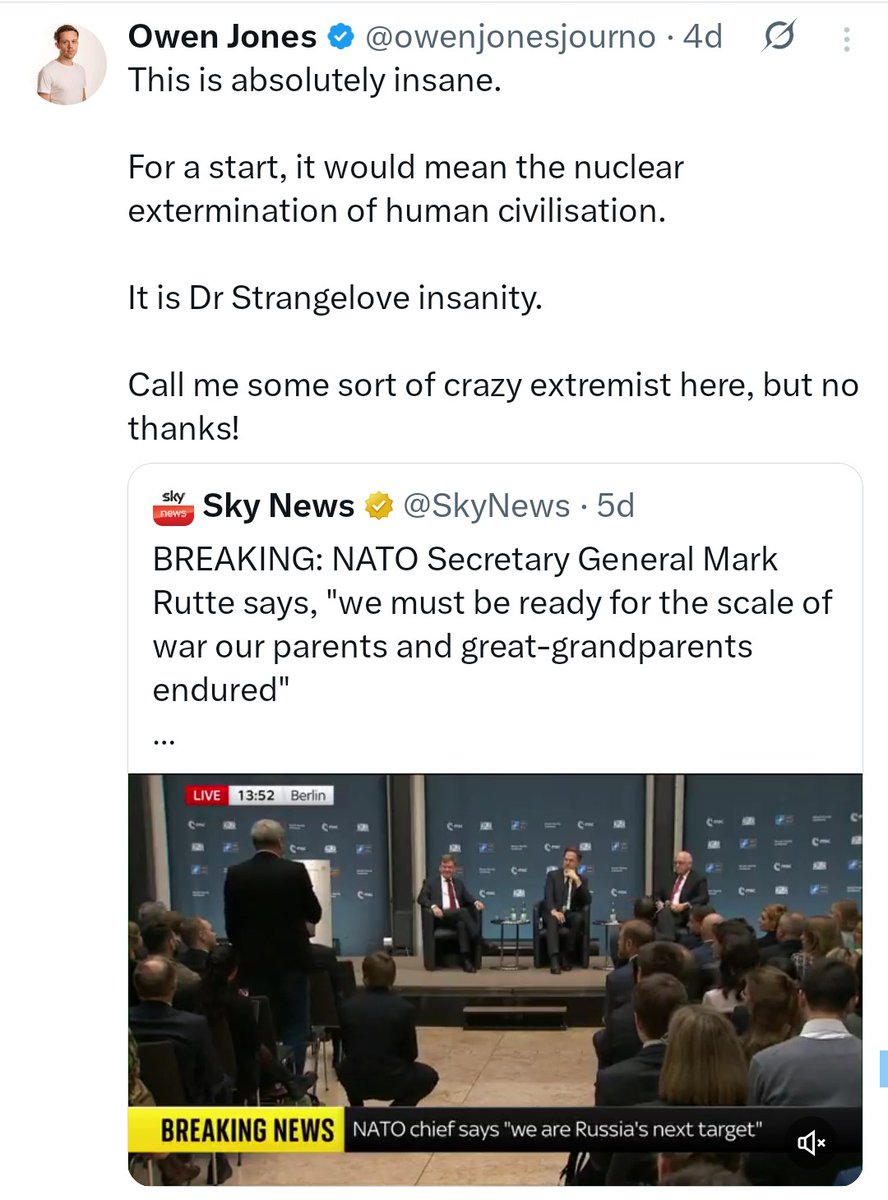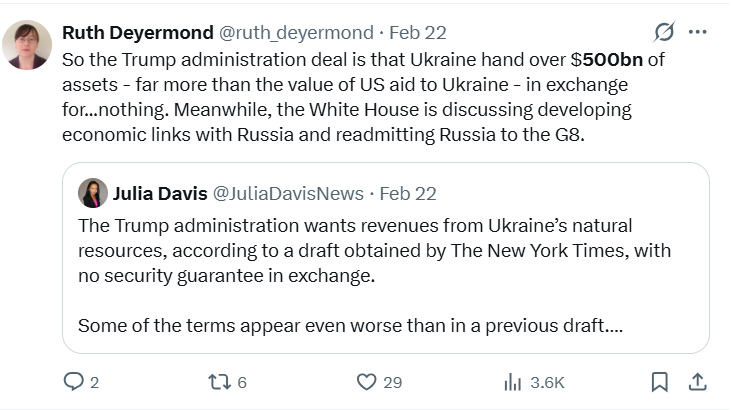Tomorrow marks six months since Russia launched its unprovoked attack on Ukraine, so this seems like a good moment to take a look at how things have turned out for Russia so far. Apologies, even more than usual, for the length of this thread.
Apologies too, for making this wholly concerned with Russia not Ukraine's heroic defence – I wanted to look in some detail at how badly Russia has screwed things up (tl;dr: very badly).
In trying to determine how successful Russia has been to date, it’s worth comparing Putin’s stated reasons for invading Ukraine with what’s actually happened. His speech on 24 Feb listed several grounds for launching the ‘special military operation’.
The first was to stop NATO expansion and to reverse the increased military presence in NATO’s easternmost states: 



The NATO expansion claim made little sense at the time since there was no meaningful prospect of Ukraine joining NATO, as everyone knew. Beyond Ukraine itself, we all know how well the attempt to stop further NATO expansion has turned out: nato.int/cps/en/natohq/…
The war has pushed two historically neutral states, one of them sharing a more than 1,000km border with Russia, to seek to join NATO. Short of Ukraine itself joining NATO, it’s hard to imagine how this outcome could be worse for Russia.
The other NATO related aim – reversing the increased military presence in eastern members and, as Putin made clear several times, resetting the strategic map of Europe to pre-1997 – hasn’t turned out too well for Russia either: nato.int/cps/en/natohq/…
It’s hard to see how no. 1, stopping Ukraine turning into ‘a hostile anti-Russia’, could have been a bigger failure than it has been. On 2, stopping NATO supplying Ukraine with weapons, obviously, there are weapons Ukraine would like but hasn’t been given for fear of escalation.
But I’m not sure that’s going to be a huge consolation for the Russian government given the staggering scale of western military aid to Kyiv, above all form the US: state.gov/775-million-in…
This was a disgusting lie at the time; the last six months of Russian crimes against humanity, genocidal actions and rhetoric, and the rapid domestic shift to something that looks very like fascism also make it look like projection.
Beyond the Russian govt’s stated goals, how well have Russian national interests (as understood from a reading of policy documents, speeches, articles, interviews) been served by the war? Very badly indeed.
Others who know far more about these topics than me have talked about issues including the effects on the Russian economy and the acceleration of Russia’s dependence on China. I want to highlight 3 issues:
First, Russia has seen maintaining its influence over the other states of the former Soviet Union (minus the Baltic States) as a foreign policy and security priority since the collapse of the USSR. The war has been very bad for this.
Ukraine is further away from Russia than ever; Moldova is on a path to EU accession, together with Ukraine. bbc.co.uk/news/world-eur…
Although Russia sent troops to Kazakhstan in Jan to prop him up during serious unrest, Kazakhstan’s president has refused to support Russia’s war and relations between Russia and this key Central Asian state are possibly the worst they’ve ever been. eurasianet.org/kazakhstan-rus…
Other states of the former Soviet Union have conspicuously failed to stand behind Russia over Ukraine. In early March, for example, only Belarus voted against a UNGA vote condemning Russia’s aggression in Ukraine, for example; the other states abstained. aljazeera.com/news/2022/3/3/…
But even Belarus has not always proved to be a helpful client state. Despite reported pressure and despite Russia's urgent need for help, Lukashenka has not involved Belarus directly in the war by sending Belarusian troops into Ukraine. thehundred.substack.com/p/why-hasnt-be…
Lukashenka’s widely-talked about resistance to Russian pressure on this issue is an embarrassment for the Kremlin – if they can’t even coerce Lukashenka, where does this leave Russian regional hegemony?
And if Russia isn’t a regional hegemon, then what happens to Russian national identity, grounded as it is in self-identified great power status that rests heavily on its hegemonic role in the post-Soviet space?
Closely related to this, the Russian govt, and particularly the armed forces, have always viewed the retention of a secure military presence in key post-Soviet states as a strategic priority.
Since 1991, the Black Sea/S. Caucasus region has been seen as an area of particular importance for Russia. The 2008 Georgia war and the 2014 annexation of Crimea consolidated Russia’s military presence in the region – which seems to have been part of the point of both operations
Although Russia’s hold over the Georgian breakaway regions of Abkhazia and South Ossetia hasn’t changed, the spectacle of Russia having to pull out its troops to fight in Ukraine raises questions about the strength of Russian military capabilities.
And if Russia continues to lose in Ukraine, its hold on Georgian territory is going to look weaker even if the current Georgian govt shows no sign of wanting to do anything about it.
As for Crimea:
https://twitter.com/DefenceU/status/1557061408340287490
It’s hard to over-state the importance of what’s happening in Crimea for the Russian military. One of the – perhaps the most – significant Ukraine-related objectives for the Russian military when the USSR collapsed was to secure control of the Black Sea Fleet in Sevastopol.
Even before 2014, the Russian BSF Sevastopol base was a key symbol of Russia’s ability to project military power. Now:
https://twitter.com/COUPSURE/status/1562017026113167360
This connects to a 3rd key national interest: the credibility of its armed forces. Russian capacity for influence has always been more coercive than attractive, despite its attempts to develop soft power. Its great power-ness relies in multiple ways on its military capabilities.
All this has been crushed by Russia’s military humiliation in Ukraine. Listing all the ways in which the invasion has been a disaster would take several more threads, but a couple of things are worth highlighting.
1. Having utterly failed in the original aim of rapidly seizing control of the key cities, Russia announced much more modest revised aims of taking all of Luhansk and Donetsk oblasts.
Months later, they still haven’t managed to do this. The front line has stayed almost unchanged for the last month and there is no sense that the situation favours Russia. 

2.The war exposed the hollowness of Russian military reform. In the 90s, Western perceptions of the Russian army were of a catastrophically ineffective force relying on poorly trained conscripts, riddled with corruption, plagued by equipment failures, and unable to adapt or learn
30 years and billions of dollars later, its reputation is back where it started in the early post-Soviet period.
If the Russian government hadn’t sent the armed forces to fight a war they were staggeringly unprepared to fight, their 21st century reputation as an effective, modernised, powerful force might well be intact. Putin has blown that reputation for a pointless vanity war.
As a general rule, it’s probably fair to say that if you expect to seize the key cities in 3 days but 6 months later they’re displaying your burned out tanks in the centre of the capital, you aren’t quite the military force you thought you were.
https://twitter.com/dwnews/status/1562044724386693120
Finally: shortly after the start of the invasion, RIA Novosti published, then quickly removed, an article clearly intended to celebrate the end of what was supposed to be a small victorious war in Ukraine. The whole thing was v. helpfully translated here: threadreaderapp.com/thread/1498065…
6 months ago, lots of people were wrong about Russia’s invasion of Ukraine, including most of us Western analysts who assumed it wouldn’t happen because we could see how badly it was likely to go and we wrongly assumed Putin could, too.
But it’s harder to imagine getting anything more comprehensively wrong than this. As became clear almost immediately, Russia’s war against Ukraine has been an abject failure that has done unprecedented damage to Russian national interests.
It has accelerated the end of what was left of its post-Soviet regional hegemony; diminished Russia’s international status; shredded the reputation of the Russian military;
and reinforced the US’s engagement with Europe and the status of Western institutions more effectively than anything since the end of the Cold War.
Putin and those around him have so far managed to achieve the exact opposite of everything they wanted from their criminal war; whatever happens from now on, it's hard to imagine they'll ever be able to undo the damage they’ve done to Russia and to themselves.
• • •
Missing some Tweet in this thread? You can try to
force a refresh













